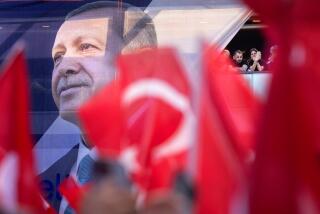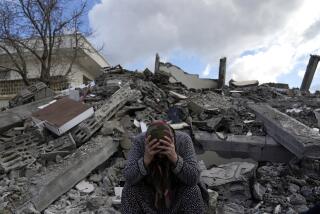Why Turkey Is So Key
- Share via
The Iraqi situation continues to be extremely worrisome, for reasons that are at once obvious and in other respects perhaps a little less glaring. On the utterly notorious side, Baghdad itself manages to keep in the headlines, whether in refusing to release two American businessmen who strayed over the Kuwaiti border last month or in rejecting Sunday the U.N. compromise proposal to partially lift international sanctions against the Iraqi sale of oil.
Baghdad’s weekend tantrum is perhaps not that surprising, even if it scotches a $2-billion oil-sale deal that would have provided Iraq with sorely needed foreign currency. But Tarik Aziz, Iraq’s cunning chief diplomat, seeks to drive a divisive wedge between Washington and the U.N. Security Council. Already France and Russia sympathize with Iraq’s position that U.N. sanctions should be completely, not partly, lifted.
But the Clinton Administration is taking the tough line. And its position seemed a whole lot less dogmatic recently when the Security Council received a report from its own monitoring team that Iraq may be concealing plans for a biological weapons program. The American position is that as long as Saddam Hussein is on top, Iraq is one tiger that is not likely to change its stripes.
But if the sanctions issue is becoming a major irritant in New York, another festering sore in the Persian Gulf area could prove at least as divisive for the West. It concerns the plight of the Kurds, who invariably get the short end of history’s stick. Right now, the Kurds in northwest Iraq are enduring, in addition to their usual statelessness, an unwanted visit by Turkish armed forces on the prowl for Kurdish guerrillas.
The government of Prime Minister Tansu Ciller--the region’s Margaret Thatcher--is in the midst of a coordinated crackdown against Kurdish activism. In fairness to Istanbul, it must be said that not every Kurdish political organization plays nice, especially the notorious terrorist group, the Kurdistan Workers Party, known as the PKK.
Even so, Turkey’s friends in Europe, which seek to bind Istanbul ever closer to the West economically as well as politically, need a Turkey that is more democratic, more tolerant of dissent, more open to cultural differences and less inclined to reach for the club whenever the internal going gets tough. Thus, Turkey’s announcement that it will soon be withdrawing its army from Iraq is welcome news indeed.
Now Prime Minister Ciller must work harder to find a genuine political solution to the Kurdish minority problem. Yes, this will mean guaranteeing human rights and allowing all minority groups, not just the Kurds, more autonomy through genuine local government.
But to fail to go in this direction will imperil not only Turkey’s relationship with the West but the future of Turkish democracy as well. And thus, ultimate stability in that volatile region.
More to Read
Sign up for Essential California
The most important California stories and recommendations in your inbox every morning.
You may occasionally receive promotional content from the Los Angeles Times.













